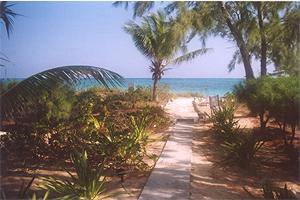Some people live by the cynical motto that there’s nothing money can’t buy. Indeed, only this explains why anyone would attempt to use personal wealth to deny public access to public beaches. Read below the arrogant follies of two rich people who thought their money entitled them to do just that:
 David Geffen of Malibu enjoying “his” beach the way he likes it…alone!
David Geffen of Malibu enjoying “his” beach the way he likes it…alone!
For over twenty years, billionaire entertainment mogul David Geffen deployed an armada of lawyers to block public access to Malibu beach via the “public” path that runs adjacent to his multimillion dollar home. And, he maintained his uncivil disobedience despite promising (over 20 years ago) to allow “access for all” in exchange for a special building permit to remodel that home.
Well, it appears Geffen has decided that he’d rather allow beach bound riff-raff to traipse past his home than continue to fund beachfront investments for his mercenary lawyers. Because last week, he finally surrendered and ceded custodial care of the beach path to a non-profit organization acting in the public interest.
 Once Geffen’s exclusive path, this most expensive beach access in the entire world is now open to the public
Once Geffen’s exclusive path, this most expensive beach access in the entire world is now open to the public
Click here for more on the Malibu beach fight.
In a similar battle down in the Turks and Caicos Islands, millionaire developer Jack Civre used ravenous guard dogs to block public access to the beach (and one that is really worth fighting for) – via a gravel road that runs adjacent to his private property. The dogs in this case, however, were not interested in generating fees to fund their seaside kennels; instead, they were quite happy to settle for a pound of flesh. And, so they did.
 A typical public beach access road that usually runs adjacent to private properties in the TCI
A typical public beach access road that usually runs adjacent to private properties in the TCI
The TCI government – not averse to discreetly accommodating the antics of the rich -must now resolve this very public spat that has civil as well as criminal ramifications. Indeed, some of the unnerving questions it must address include:
Did the TCI government grant a special permit to Civre to bar residents from using the public access road to the beach?
Given the public interest in this dispute, will the government issue a declarative statement clarifying the relative rights between Civre and the public concerning the use of this road?
And, will TCI prosecutors investigate whether criminal charges are warranted based on the claims of the dog-bite victim who dared to take this road less traveled to the beach?
It’s probably a good thing though that black TCIslanders aren’t too interested in going to the beach. Because, just imagine the national scandal if (white) Civre’s dogs had taken a bite out of a black islander? (Bull Connor would be burning with nostalgic glee down in hell.)
As things stand, it may be that this squabble between white folks over access to tan themselves (black) is just too Caucasian to cause the black government any worry at all. Nevertheless, this national birthright (i.e., access to all public beaches) must be protected and vindicated.
Click here to read how this story played in the local press.
News and Politics
Ellis Bodden says
Why do you presume that all West Indians are black. As a white West Indian I take exception to that generalization in your blog on beach access. Most islands in the caribbean have complete public access – Cayman Islands, Barbados, BVI, to name a few.
Back to my point, yes the majority of the English speaking West Indies is black, but “we should not generalize” as they say in the US.
Now, if someone were to publically state or imply in a news or blog item in the U.S. that the U.S. was a country of whites, the blacks and liberals would cry bloody murder.
Ellis Bodden
Cayman Islands
ALH ipinions says
Mr Bodden
I suppose a very self-conscious reading of this article might mislead you to infer that I “presume that all West Indians are black”.
However, please allow me to remind you that this article is about beach access. And, ironically, you make my point by asserting – as many White West Indians do – that the problem of beach access is exaggerated.
But this is understandable because it is an exception when a local white person is denied such access (fitting in as you do with the stereotypical image of a tourist or privileged island resident). Whereas, it is the rule that local blacks are almost always denied access or harassed at purportedly public beaches throughout the Caribbean.
But if you take exception to my word on this subject, perhaps you will find the 6 September 2004 editorial in the Caribbean Net News more persuasive. It is entitled “Dah Beach Belong To We” and cites, coincidentally, (your) Cayman Islands as a place where local (blacks) are denied beach access, systematically.
Thank you for your commment. I appreciate your reading my weblog.